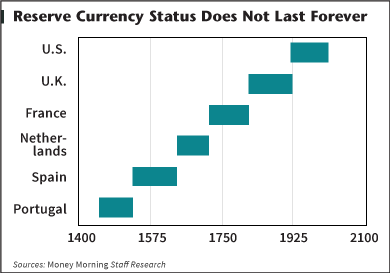The yuan reserve currency approval, announced today (Monday) by International Monetary Fund Managing Director Christine Lagarde, has sealed the fate of the U.S. dollar.
As of Oct. 1, 2016, the Chinese yuan will become part of the International Monetary Fund's basket of reserve currencies, joining the euro, the Japanese yen, the British pound, and the U.S. dollar.
 The IMF yuan reserve currency approval ensures that the days of the dominance of the U.S. dollar are coming to an end.
The IMF yuan reserve currency approval ensures that the days of the dominance of the U.S. dollar are coming to an end.
"China's [yuan] is ultimately destined to replace the U.S. dollar as the world's primary reserve currency, while China's central government bond market will become the world's primary reference market for fixed income," Jan Dehn, head of research at Ashmore Group, wrote in a research note.
Dehn explained that given the size of China's economy and its high rate of growth relative to the U.S. economy, this outcome is "inevitable."
Yuan Reserve Currency Status Was Long-Planned
The IMF yuan reserve currency approval is the latest step in China's decades-long strategy to replace the U.S. dollar as the world's primary reserve currency, a status the dollar has held since edging out the British pound in the middle of the last century.
Most financial news outlets are downplaying the news, assuring investors that nothing will change in the short term. While that's true, things very surely will change over the medium and long terms. And for the U.S. dollar, those changes become increasingly grim as time goes on.
Even before the yuan reserve currency approval becomes official next October, we'll start to see changes.
At least 10% of global foreign currency reserves - $1 trillion - will switch into the yuan practically overnight, mostly at the expense of the U.S. dollar.
But Money Morning Chief Investment Strategist Keith Fitz-Gerald believes that $1 trillion figure vastly underestimates what lies in store for us...
What a Yuan Reserve Currency Means for the U.S. Economy
"I think that's low and the figure may hit $2 trillion as China's onshore capital markets mature because China is growing far faster than Westerners are prepared to accept," Fitz-Gerald said.
A shift of $2 trillion would affect 17.45% of all foreign exchange reserves.
"More than 60% of total declared reserve holdings are dollar-denominated, and roughly 40% of the world's daily $5 trillion currency transactions are dollar-based," Fitz-Gerald said. "That's going to change."
It already has. Use of the yuan in global trade has been growing rapidly. And it's the fourth most liquid currency as measured by global payments.
"As of August, the yuan accounted for 2.79% of the world's total payment volume. That's a jump of 9.13% at a time when payments across other currencies have fallen by 8.3%, according to Swift," Fitz-Gerald said. "Plus, there are now nearly 2,000 financial institutions processing payments in yuan, some 600 of which don't even have an office in China."
Rising demand for a yuan world reserve currency will over time result in less demand for the U.S. dollar. And that will have grave consequences for the U.S. economy.
When foreign governments start to dump the $6 trillion they hold, U.S. dollars will flood the market and trigger massive inflation. And with fewer buyers of its debt, the United States will find it much more difficult to borrow trillions with no consequence.
In the arena of international trade, the United States will increasingly find it necessary to convert dollars to yuan to do business with other nations.
And as the yuan grows more dominant, more and more global capital will flow to China instead of Wall Street.
At that point, America's debt-fueled economic expansion will screech to a halt.
[mmpazkzone name="in-story" network="9794" site="307044" id="137008" type="4"]
And the wheels already are in motion.
"China has had the largest economy in the world for 18 out of the last 20 centuries," Fitz-Gerald said. "The difference is, they're driven by 1.3 billion people that want to live the way we do, an economic machine that is still very much in growth mode, a working population that is a prime age - 18 to 54 - and they've got $3.1 trillion in reserves. We're $221 trillion in the hole."
Follow me on Twitter @DavidGZeiler or like Money Morning on Facebook.
China Just Opened Your Next Window of Opportunity: By scrapping its one-child rule, China's created a massive investment opportunity. This policy reversal will drive an historic shift in production and consumption that will double the size of China's economy by 2035. The time to act is now. Here's how to align your money for maximum profit...
Related Articles:
- Barron's: China: Yuan Will Replace U.S. Dollar?
About the Author
David Zeiler, Associate Editor for Money Morning at Money Map Press, has been a journalist for more than 35 years, including 18 spent at The Baltimore Sun. He has worked as a writer, editor, and page designer at different times in his career. He's interviewed a number of well-known personalities - ranging from punk rock icon Joey Ramone to Apple Inc. co-founder Steve Wozniak.
Over the course of his journalistic career, Dave has covered many diverse subjects. Since arriving at Money Morning in 2011, he has focused primarily on technology. He's an expert on both Apple and cryptocurrencies. He started writing about Apple for The Sun in the mid-1990s, and had an Apple blog on The Sun's web site from 2007-2009. Dave's been writing about Bitcoin since 2011 - long before most people had even heard of it. He even mined it for a short time.
Dave has a BA in English and Mass Communications from Loyola University Maryland.



